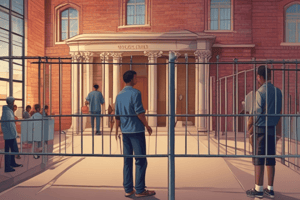Podcast
Questions and Answers
What legal victories do we learn of in the beginning of the chapter?
What legal victories do we learn of in the beginning of the chapter?
The Supreme Court banned life in prison without parole sentences for juveniles convicted of non-homicide offenses and mandatory life in prison sentences for juveniles convicted of homicide.
What additional ban does the author seek?
What additional ban does the author seek?
A ban on jailing juveniles with adults.
What four institutions in American history have shaped our approach to race and justice?
What four institutions in American history have shaped our approach to race and justice?
Slavery, racially-motivated terrorism from the collapse of Reconstruction till World War II, Jim Crow, and mass incarceration.
Why might the author spend more time on three institutions compared to slavery?
Why might the author spend more time on three institutions compared to slavery?
What was 'convict leasing'?
What was 'convict leasing'?
Why did EJI take on approximately two hundred new cases following the bans mentioned?
Why did EJI take on approximately two hundred new cases following the bans mentioned?
Who was the first person released because of the ban on life sentences for juveniles, and what was the reaction?
Who was the first person released because of the ban on life sentences for juveniles, and what was the reaction?
What is meant by 'stonecatcher'?
What is meant by 'stonecatcher'?
Why is participation in a re-entry program helpful to tell a judge or parole board?
Why is participation in a re-entry program helpful to tell a judge or parole board?
How did inmates' 'disciplinaries' affect resentencing hearings?
How did inmates' 'disciplinaries' affect resentencing hearings?
Study Notes
Legal Victories and Reforms
- The Supreme Court prohibited life without parole for juveniles in non-homicide cases and mandatory life sentences for juvenile homicide cases.
- Efforts are underway to establish a ban on placing juveniles in adult jails.
Historical Context of Race and Justice
- Four significant institutions influencing race and justice:
- Slavery
- Racially-motivated terrorism post-Reconstruction until World War II
- Jim Crow laws
- Mass incarceration
Understanding Slavery and Its Legacy
- Slavery is recognized as a blatant instance of racial persecution, whereas the other three institutions involve more complex and less widely understood histories.
Convict Leasing Explained
- Convict leasing emerged around the late 1800s as a system where businesses could exploit incarcerated individuals for labor, often targeting black individuals through unfounded convictions.
EJI and Resentencing Cases
- Following the Supreme Court verdicts, the Equal Justice Initiative (EJI) took on around 200 new cases, focusing on juvenile inmates eligible for reconsideration of their sentences despite lacking clear rights to legal counsel.
Notable Release Case
- Robert Caston was the first inmate released under the new mandates after 45 years in prison, eliciting cheers from the courthouse audience.
Concept of a "Stonecatcher"
- "Stonecatcher" symbolizes someone who intervenes or protects others from judgment or harm, related to a biblical reference where Jesus prevents the stoning of an accused woman.
Importance of Re-entry Programs
- EJI initiated re-entry programs to support released inmates, recognizing that participation can demonstrate to judges or parole boards a commitment to rehabilitation and lower risks of reoffending.
Impact of Disciplinaries on Sentencing
- Inmates received "disciplinaries" for misbehavior, often unavoidable, which could extend their sentences; prosecutors used these records against inmates seeking reduced sentences during resentencing hearings.
Studying That Suits You
Use AI to generate personalized quizzes and flashcards to suit your learning preferences.
Description
Explore key legal victories highlighted in Chapter 16 of 'Just Mercy'. This set of flashcards focuses on important rulings regarding juvenile sentencing and the author's advocacy for juvenile justice reform. Test your understanding of crucial concepts and definitions from the chapter.




